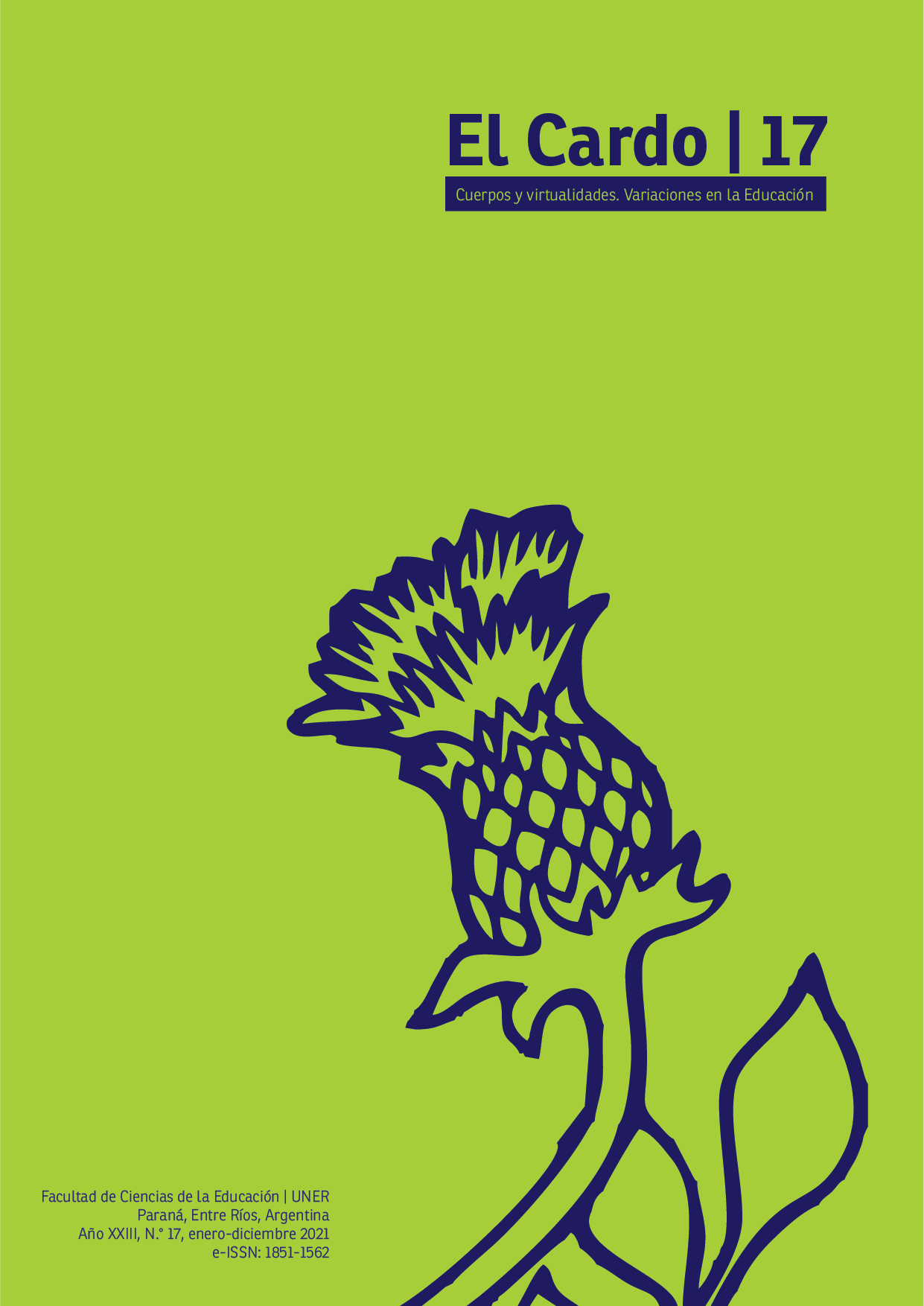Educación y virtualidad: una apuesta posible
Contenido principal del artículo
Resumen
Durante el año 2020 la pandemia por COVID-19 irrumpió en las condiciones concretas de existencia y de la cotidianeidad de la población mundial. El mundo entero se enfrentó a un fenómeno sin precedentes e impensado hasta el momento. La educación universitaria se vio obligada a establecer nuevos modos para llevar adelante las clases: los entornos virtuales de aprendizaje.
Específicamente, los espacios curriculares de prácticas profesionales supervisadas tuvieron el desafío de rediseñar las prácticas en terreno –planificadas generalmente desde la presencialidad física– de modos novedosos, diferentes, más allá de lo establecido por las pautas académicas prescriptas en torno a estas actividades.
Integramos un equipo de cátedra que lleva adelante uno de los espacios curriculares de práctica previstos en la Licenciatura de Psicología, de la Facultad de Humanidades, Artes y Ciencias Sociales, Universidad Autónoma de Entre Ríos: la Práctica Profesional Supervisada (PPNS) en Grupo, Organización, Institución y Comunidad.
En este escrito, intentaremos hacer un recorrido por la experiencia de recrear un espacio académico en entornos virtuales de aprendizaje. Asimismo, reflexionaremos sobre la complejidad que ello requirió al momento de pensar una práctica desde lo posible en un escenario de pandemia y aislamiento.
Fecha de recepción: 4/5/201
Fecha de aceptación: 6/7/2021
Descargas
Detalles del artículo

Esta obra está bajo una licencia internacional Creative Commons Atribución-NoComercial-CompartirIgual 4.0.
Las ediciones no tienen cargos para las y los autores ni para las y los lectores, y se incita a las y los autores a depositar sus contribuciones en otros repositorios institucionales y temáticos, con la certeza de que la cultura y el conocimiento son un bien de todos y para todos. El Cardo permite la reutilización luego de su edición (Post print) citando la autoría y la fuente original de su publicación. Su uso no puede ser con fines comerciales.
Citas
CARBALLEDA, A. (2015). El territorio como relato. Una aproximación conceptual en Margen Revista de Trabajo Social y Ciencias Sociales, vol. 76, 2015.
COREA, C., DE LA ALDEA, E. y LEWCOWICZ, I. (1998). La comunidad, entre lo público y lo privado. En Revista Campo Grupal N.° 2, septiembre-octubre. Buenos Aires.
Decreto N.° 297 de 2020. Aislamiento social, preventivo y obligatorio. 19 de marzo de 2020.
DEL CUETO, A. (2014). La Salud Mental Comunitaria: intervenciones comunitarias. Vivir, pensar, desear. Fondo de Cultura Económica: Buenos Aires.
KUTZBART, A. (2021). Pensando la educación desde los afectos, las tensiones y la necesidad de contacto. Topía, marzo 2021. Disponible en: https://www.topia.com.ar/articulos/pensando-educacion-afectos-tensiones-y-necesidad-contacto?utm_source=Bolet%C3%ADn+Top%C3%ADa&utm_campaign=afe4c4a487-REVISTA_90_TODOS_COPY_01&utm_medium=email&utm_term=0_bf055be65c-afe4c4a487-36235045&mc_cid=afe4c4a487&mc_eid=8d4caf5cbe
LEWKOWICZ, I. (2004). Pensar sin Estado. La subjetividad en la era de la fluidez. Buenos Aires: Paidós.
LOURAU, R. (1975). El Análisis Institucional. Buenos Aires: Amorrortu.
NICASTRO, S. y GRECO, M. (2009). Entre Trayectorias. Escenas y pensamientos en espacios de formación. Santa Fe: Homo Sapiens.
SCHEJTER, V., COCHA T., FURLAN, G. Y UGO F. (2016). Una mirada institucional de lo psicológico: La alteridad en nosotros. Colecciones Psicología. Buenos Aires: Eudeba.
SCHÖN, D. (1992). La formación de profesionales reflexivos. Hacia un nuevo diseño de la enseñanza y el aprendizaje en las profesiones. Barcelona: Paidós.
SOUTO, M. (2004). La formación de docentes en el análisis multirreferenciado de clases. En: Educación, Lenguaje y Sociedad, vol. 2, N.° 2, 2004.

